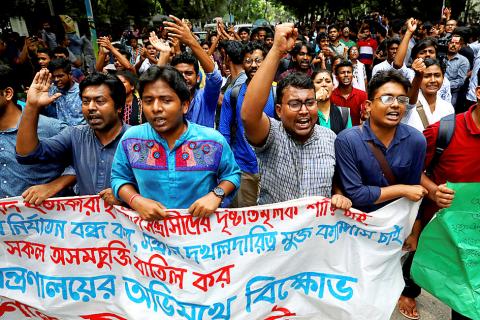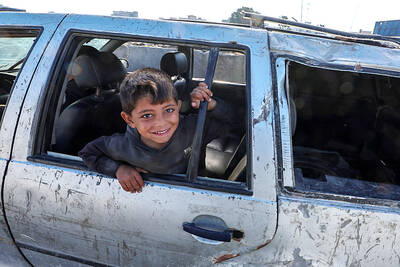The father of an engineering student who was beaten to death at his university halls in Bangladesh has demanded justice for his son, as protests against politically motivated attacks on campuses continued.
Abrar Fahad, 22, who was allegedly targeted after he criticized the government on Facebook, was found dead at his university halls of residence in Dhaka on Monday.
It is claimed that he was attacked by students linked to the Bangladesh Chhatra League (BCL), an influential student wing of Bangladeshi Prime Minister Sheikh Hasina’s Awami League.

Photo: Reuters
Barkat Ullah, Fahad’s father, said his son had hoped to study a doctorate and wanted to serve his country.
“The university administration has to take strict measures to stop such incidents,” he said. “They should know what’s happening inside their dormitory. They have to hold them accountable. If they can do that, then maybe these kind of incidents will stop happening.”
Fahad’s death has caused outrage across the nation, prompting protests by students at universities in Dhaka, Chittagong and Rajshahi, and demands for authorities to clampdown on political violence on campuses.
Human rights groups have condemned groups such as the BCL, which have been accused of beating student protesters and stifling debate.
Last year, students who had launched a protest calling for greater road safety were beaten with sticks and machetes in attacks widely blamed on the Awami League and its youth wing.
Authorities took no action against those carrying out the violence, but instead detained the protesting students, Human Rights Watch said.
A first-year student from Bangladesh University of Engineering and Technology in Dhaka, where Fahad was studying, said students did not feel safe in the halls of residence.
“We never speak freely,” he said.
Fahad was in his second year at the most competitive university in the nation, where he was studying electrical and electronic engineering.
Friends said he was attacked because he had written a Facebook post criticizing deals signed during Hasina’s visit to India.
They included controversial deals on water sharing and on exporting petroleum gas to India, which many argued were not in the nation’s interests.
According to an autopsy report, he died of severe internal bleeding from beatings with blunt objects.
“Fahad was a very simple person. He had a naive mind. My son, he wanted to go abroad for higher study,” Ullah said.
Amnesty International described his murder as a “horrific crime that must be investigated immediately.”
“Abrar was only exercising his peaceful right to freedom of expression in his Facebook posts criticizing the government,” the human rights group said in a statement.
Hasina has promised justice to Fahad’s family. At least 11 students have reportedly been arrested in connection with his murder.
Hundreds of students and teachers on Wednesday took part in a silent procession at Fahad’s university in the capital.
A second student at the university, who also wished to remain anonymous, said that the humiliation and beatings of students had been repeatedly ignored.
“The ragging [bullying and beating] has always been a massive problem. For many past incidents, we reported them to authorities, but they never took any serious action, and this was a result of their negligence,” the student said. “The perpetrators never thought they’d face any consequences. It’s a shame that someone has to get killed to bring the issue under [the] spotlight.”

MONEY GRAB: People were rushing to collect bills scattered on the ground after the plane transporting money crashed, which an official said hindered rescue efforts A cargo plane carrying money on Friday crashed near Bolivia’s capital, damaging about a dozen vehicles on highway, scattering bills on the ground and leaving at least 15 people dead and others injured, an official said. Bolivian Minister of Defense Marcelo Salinas said the Hercules C-130 plane was transporting newly printed Bolivian currency when it “landed and veered off the runway” at an airport in El Alto, a city adjacent to La Paz, before ending up in a nearby field. Firefighters managed to put out the flames that engulfed the aircraft. Fire chief Pavel Tovar said at least 15 people died, but

LIKE FATHER, LIKE DAUGHTER: By showing Ju-ae’s ability to handle a weapon, the photos ‘suggest she is indeed receiving training as a successor,’ an academic said North Korea on Saturday released a rare image of leader Kim Jong-un’s teenage daughter firing a rifle at a shooting range, adding to speculation that she is being groomed as his successor. Kim’s daughter, Ju-ae, has long been seen as the next in line to rule the secretive, nuclear-armed state, and took part in a string of recent high-profile outings, including last week’s military parade marking the closing stages of North Korea’s key party congress. Pyongyang’s official Korean Central News Agency (KCNA) released a photo of Ju-ae shooting a rifle at an outdoor shooting range, peering through a rifle scope

South Korea would soon no longer be one of the few countries where Google Maps does not work properly, after its security-conscious government reversed a two-decade stance to approve the export of high-precision map data to overseas servers. The approval was made “on the condition that strict security requirements are met,” the South Korean Ministry of Land, Infrastructure and Transport said. Those conditions include blurring military and other sensitive security-related facilities, as well as restricting longitude and latitude coordinates for South Korean territory on products such as Google Maps and Google Earth, it said. The decision is expected to hurt Naver and Kakao

Gaza is rapidly running out of its limited fuel supply and stocks of food staples might become tight, officials said, after Israel blocked the entry of fuel and goods into the war-shattered territory, citing fighting with Iran. The Israeli military closed all Gaza border crossings on Saturday after announcing airstrikes on Iran carried out jointly with the US. Israeli authorities late on Monday night said that they would reopen the Kerem Shalom crossing from Israel to Gaza yesterday, for “gradual entry of humanitarian aid” into the strip, without saying how much. Israeli authorities previously said the crossings could not be operated safely during